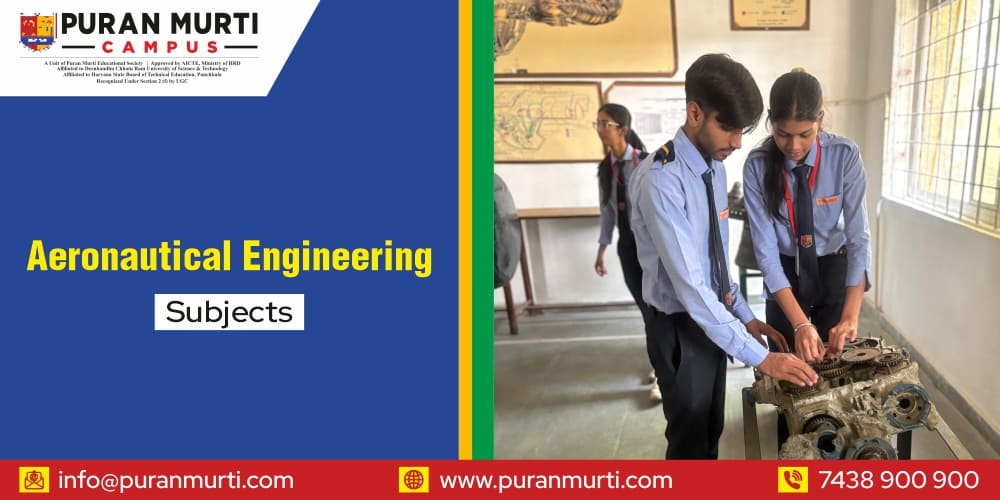Aeronautical Engineering Subjects
Posted on : 24 June, 2025 1:56 pm
Aeronautical Engineering Subjects: What You’ll Actually Study Before You Fly High
So, you’ve got your eyes on the skies and your heart set on aeronautical engineering and the aeronautical engineering subjects. Maybe you’ve always been fascinated by airplanes, or maybe you’re someone who can’t stop watching aircraft take off while imagining what goes on inside their engines. Either way, you’re probably asking the one big question every aspiring aeronautical engineer has at some point:
“What exactly will I study in aeronautical engineering?”
Let’s break it down—no jargon, no fluff, just a clear look at the subjects that make up this high-flying course.
🚀 First of All, What Is Aeronautical Engineering?
Aeronautical engineering is a branch of aerospace engineering that focuses specifically on aircraft that fly within the Earth’s atmosphere. Think airplanes, helicopters, drones—not rockets (that’s more astronautical).
And just like how a pilot needs to master both theory and flight, aeronautical engineers learn a mix of science, math, mechanics, and hands-on tech.
🎓 Core Subjects in Aeronautical Engineering (B.Tech/B.E. level)
Here’s a peek at the core subjects you’ll encounter, typically over 4 years (8 semesters):
1. Engineering Mathematics
You can’t escape math—and in this field, you really don’t want to. Topics include:
-
Calculus
-
Differential equations
-
Linear algebra
-
Numerical methods
Why it matters: Math forms the foundation for modeling flight dynamics and solving real-world engineering problems.
2. Engineering Physics & Chemistry
These are more in the first year and act as a base for understanding material properties, forces, and chemical behavior in flight systems.
3. Mechanics of Solids
This teaches how aircraft structures handle loads and forces. You’ll learn:
-
Stress and strain
-
Bending, torsion
-
Structural failures
It’s basically the science of “will the wing break or not?”
4. Fluid Mechanics & Aerodynamics
Now we’re getting airborne! This is where you study:
-
Airflow around aircraft
-
Lift and drag
-
Bernoulli’s principle
-
Wind tunnel testing
It’s like learning how to make air “work for you” so your plane doesn’t drop like a rock.
5. Propulsion Systems
Ever wonder what makes a jet engine roar? In this subject, you’ll explore:
-
Jet engines
-
Turbojets, turbofans, ramjets
-
Fuel efficiency and thrust generation
6. Aircraft Structures
Here, you study the skeleton of an aircraft—wings, fuselage, landing gear. Topics include:
-
Structural design
-
Materials like aluminum alloys and composites
-
Vibration analysis
7. Flight Dynamics & Control
This is where you learn how an aircraft behaves in the air and how to control that behavior:
-
Stability
-
Pitch, yaw, roll
-
Autopilot systems
You’ll probably never look at a cockpit the same way again.
8. Avionics
Avionics = aviation + electronics. In this digital era, avionics are the brain of the plane:
-
Navigation systems
-
Radar and communication
-
Flight control electronics
9. Aircraft Design
This is where everything comes together. You’ll learn to design an aircraft from scratch based on performance requirements, safety norms, and cost constraints.
It’s part science, part creativity, and fully awesome.
🛠️ Lab Work & Practical Training
Engineering isn’t just about books. Aeronautical programs include:
-
Wind tunnel experiments
-
Propulsion labs
-
CAD/CAM workshops
-
Structural testing
-
Internships at aerospace companies or airports
📚 Elective Subjects (Advanced or Optional)
In later semesters, you might get to choose from cool electives like:
-
Space Technology
-
UAV (Drone) Design
-
Aircraft Maintenance Engineering
-
Computational Fluid Dynamics (CFD)
-
Rocket Propulsion
💡 Soft Skills & Management
Don’t be surprised to see subjects like:
-
Communication skills
-
Engineering ethics
-
Project management
Because being a successful engineer isn’t just about building—it’s also about presenting, leading, and problem-solving in teams.
🎯 So, What Do These Subjects Prepare You For?
By the end of your degree, you’ll be able to:
-
Design an aircraft (on paper and software)
-
Understand how it flies and how to control it
-
Solve real engineering challenges using math, physics, and logic
-
Work in sectors like aviation, defense, drone tech, and even space
🛫 Final Thoughts: Ready for the Ride?
If you’re someone who loves machines, logic, and a bit of adventure, the subjects in aeronautical engineering won’t just educate you—they’ll inspire you. Each subject builds toward one goal: giving you the tools to make things fly, safely and efficiently.
So buckle up. It’s not an easy course, but it’s a journey worth taking.

